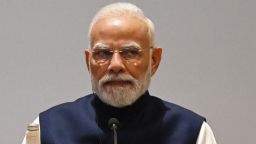India has rejected claims made by US President Donald Trump that it had agreed to cease importing oil from Russia. This denial highlights ongoing tensions between New Delhi and Washington, particularly regarding energy policy. On October 4, 2023, Trump stated that Indian Prime Minister Narendra Modi had assured him that India would stop purchasing Russian oil, which is currently subject to US sanctions. He described this as a “big step” for both nations.
In a swift response, India’s foreign ministry spokesperson Randhir Jaiswal stated he was “not aware of any conversation” between Trump and Modi about such an assurance. Jaiswal emphasized India’s position as a “significant importer of oil and gas,” without specifically naming Russia or referencing Trump’s remarks. The ministry reiterated that its energy policy focuses on ensuring stable prices and secure supplies, which involves diversifying energy sources to meet market demands.
India has maintained strong ties with Russia, a relationship that has grown closer following Moscow’s invasion of Ukraine in 2022. As a result, India has emerged as one of the largest buyers of Russian oil, a trend that has continued despite pressure from the US. The Indian government has consistently stated that it will prioritize the energy needs of its population, now exceeding 1.4 billion people, over external pressures.
The US has expressed its concerns regarding India’s oil purchases, with Trump previously imposing a 25% tariff on imports of Russian oil and gas as a penalty. This tariff is in addition to a previously announced 25% rate, reflecting the US’s attempt to curb Russia’s oil revenue amid international sanctions. Analysts suggest it would be challenging for India to abruptly halt its imports from Russia, which currently supplies approximately 1.7 to 1.8 million barrels of oil per day.
According to Muyu Xu, a senior oil analyst at trade intelligence firm Kpler, “I don’t think India can stop buying Russian oil overnight. The volumes are simply too large.” Xu noted that replacing this volume from other sources would not be straightforward due to differences in crude quality and refinery yields.
Data from Kpler indicates that India’s state-owned refiners have reduced their purchases of Russian oil in recent months. For instance, the Indian Oil Corporation Limited bought 10.35 million barrels of Russian oil in January 2023, but this figure fell to 4.62 million barrels by September. In October, the corporation has already acquired 7.03 million barrels.
CNN has reached out to the Indian Oil Corporation Limited to confirm whether it plans to continue purchasing Russian oil and the factors influencing its sourcing strategy. Modi’s approach reflects a broader political image of a strong leader prioritizing India’s interests in a complex international landscape.
In recent weeks, both countries have engaged in diplomatic efforts to mend relations, with trade delegations focused on resolving outstanding issues. Indian Foreign Minister S. Jaishankar acknowledged that India has “issues with the United States,” attributing some of the friction to unresolved trade negotiations. He remarked that both nations have yet to reach a consensus on trade discussions but are actively seeking solutions.
“Those issues need to be negotiated and discussed and resolved, which is exactly what we are trying to do,” Jaishankar stated. As the situation evolves, how India navigates its energy policy in relation to Russian imports remains a critical point of interest for international observers.








































































